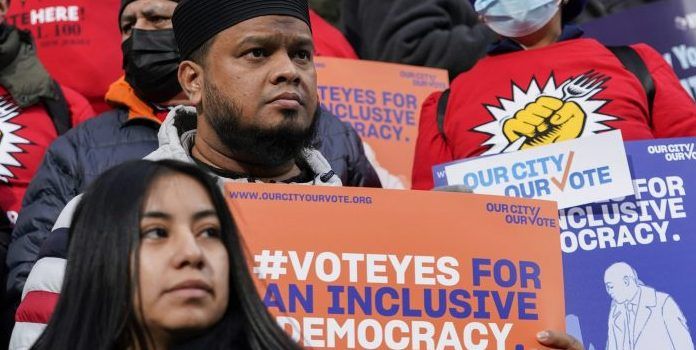(John McCann, Headline USA) The New York Supreme Court has tossed out a New York City law that would allow non-citizens to vote in municipal elections. The ruling comes as a blow to leftist efforts to expand their voting base in the Democrat stronghold.
The court ruled in a 13-page opinion that the law violated the state constitution, reported Blaze Media. Judge Ralph Rorzio wrote the court’s opinion stating, “the New York State Constitution explicitly lays the foundation for ascertaining that only proper citizens retain the right to voter privileges.”
The judge continued by saying that, “based upon the foregoing analysis, the Court finds that the Municipal Voting Law explicitly violates the New York State Constitution, as only ‘citizens’ may vote in elections.”
The law in question was passed last December by the New York City Council and signed by NYC Democrat Mayor Eric Adams. The law extended the right to vote to all non-citizens who lived, worked and payed taxes within the city.
Democrats statewide, along with immigration activists celebrated the law, which would have enfranchised more than 800,000 new voters starting in 2023. But the RNC and state GOP officials had a different opinion on the matter and promptly took the law to court.
The judge’s agreed with the RNC’s claims that the NYC law violated not only the state constitution, but also state election law. It even violated New York’s Municipal Home Rule Law that permit city actions in the eyes of the state constitution.
As Judge Rorzio explained, “There is no statutory ability for the City of New York to issue inconsistent laws permitting non-citizens to vote and exceed the authority granted to it by the New York State Constitution.”
It is important to note that the New York Supreme Court functions as the trial-level court, which means their decisions can be appealed. If it is appealed, it would advance to the New York Court of Appeals which is actually the state’s highest court.
Adam’s office informed the New York Times that they are “evaluating next steps” in the wake of the Supreme Court’s decision. It is safe to say that this legal battle may be only just beginning.

